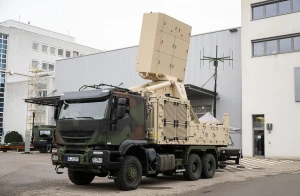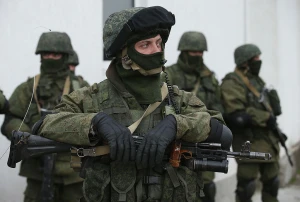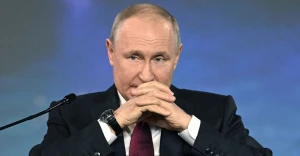
Russian fire adjusters: who they are and why they cooperate with FSB
Unfortunately, there are enough Russian agents in the rear. Adjusters are also working in the Lviv region, and Russian special services are actively looking for someone to recruit
Contents
1. The most high-profile SBU special operations in Lviv region
2.How the recruitment takes place
3. The FSB also recruits teenagers
4.How the correctors are exposed
5. What punishment the correctors face
6. "People's homes and minds are a mess"
The Espreso TV channel tells more about the cases of correctors in the Lviv region, how they are recruited and what motivates people to betray the state.
The most high-profile SBU special operations in Lviv region
In May, a court in Lviv sentenced a traitor who corrected the strike on the Yavoriv training ground on March 13, 2022, to 15 years in prison. Russian troops fired more than 30 missiles from the territory of the Russian Federation at the International Peacekeeping and Security Center in the Lviv region. More than 60 people were killed.
In June 2022, the SBU detained Oleksandr Kostornyi, a former KGB officer. The case was popularly nicknamed the "mushroom case" because Kostornyi claimed that he was marking mushroom spots on a map, not targets for a Russian attack.
Undoubtedly, the case of Kostornyi, a 73-year-old man and allegedly a fan of "quiet hunting," is among the most high-profile operations. He has lived in Lviv all his life and has two daughters, who later visited him in court. This case is about a kind of "sleeper agent" of the Russian special services, who, under the disguise of an elderly man, an ordinary pensioner, was waiting for the right moment... or rather, an order.
Oleksandr Kostornyi was a KGB major, but had been retired for many years. The man was engaged in "activist" work, participating in dubious events, such as a congress of Russian and "anti-fascist" organizations in Lviv and western Ukraine. By the way, it was his organization that used to operate in the Russian Cultural Center in Lviv, from where they were expelled in 2017.
According to the special services, after Russia's full-scale invasion, he worked closely with two Russians. His task was to pass on accurate information about the location of military units in the Lviv region, particularly in the Yavoriv district. On March 4, 2022, he sent the Russians a detailed map of the International Peacekeeping and Security Center in a telegram, which showed barracks, dormitories, and other infrastructure in detail. Kostornyi labeled them as "mushroom places".
By the way, his accomplice is the former leader of the banned Russian Bloc party, Oleksandr Svystunov, who moved to the territory of the Autonomous Republic of Crimea in 2013. He stayed there after the seizure of the Ukrainian peninsula and began to assist the invaders. Before moving, he lived in Lviv and was involved in the creation of party cells. It was to him that the "mushroom man" sent information first directly and later through a liaison.
"No matter what they say, it all comes down to money. One of the important factors in this regard is the way a person lives, so it's all about the price. Kostornyi is ideological, but he is an exception to the rule. And he has been like this since the days of the KGB in Lviv, a "die-hard Muscovite." You know, there are people who never refuse. Kostornyi was offered the job, and he would not have refused. It's not that he wants to restore the USSR, it was his younger years, you know?" comments the source of the special service to Espreso.West.
Russian agent voyager
In 2023, the special services detained an engineer from a state-owned enterprise in eastern Ukraine. The engineer was recruited by the Russians at the beginning of the full-scale invasion and was supposed to collect information on the location of strategic facilities in the southeastern regions of Ukraine. Under the guise of business trips, the agent also traveled to Kyiv and Zaporizhzhia, where he was supposed to identify energy and railroad infrastructure facilities. The engineer reported on the condition of the facilities and their location to the FSB. Moreover, he offered the Russians his assistance in developing a new radar system based on information about the Ukrainian radar.
The traitor was caught during another "business trip", this time to Lviv region. Here, his task was to identify critical infrastructure and generally collect information about such facilities in order to prepare another missile strike.
As it turned out during the search, the engineer of a Ukrainian state-owned enterprise was a supporter of the communist totalitarian regime. At least that's the symbolism found on his cell phone, which he used to communicate with the enemy.
Displaced collaborator
As you can see, anyone can be an enemy agent. In particular, disguise as an IDP fleeing the war and seeking refuge in the western regions of Ukraine is being practiced.
Thus, a collaborator from Donetsk region, who was hiding in western Ukraine under the guise of an IDP, will spend 13 years behind bars. According to the SBU, at the beginning of Russia's invasion, the man was passing on the locations of the Ukrainian Armed Forces in the Lyman sector to the occupiers. After the liberation of Lyman from the invaders, the "waiter" decided to flee to the Lviv region under the guise of an IDP. Later, he decided to resume his contacts with the occupiers and start conducting reconnaissance in western Ukraine.
In December 2022, he was caught, and in January 2023, the man was brought to justice.
There are Russian agents even in prisons
The FSB agent was serving his sentence in a penal colony in the Lviv region. He assisted in the preparation of a Russian air attack on the military and critical infrastructure of the region. Among the main targets of the racists were transit points for heavy weapons of the Armed Forces of Ukraine and local thermal power plants.
Additionally, the prisoner was looking for people who were supposed to record the possible movement of military equipment in the border area of the Lviv region.
To gather information and to direct Russian missiles and drones at Ukrainian targets, the defendant tried to create his own network of informants. The prisoner wanted to involve his close relatives and acquaintances "on the outside". For each completed task, the enemy special service "promised" from 1 to 5 thousand dollars.
This case is also interesting because it shows one of the methods of recruitment:
The agent was a 48-year-old local resident who has been in prison since 2019. The FSB spotted him after a post on social media in which the prisoner supported Russia's aggression. Interestingly, the Russian special services decided to recruit the man because of his acquaintance with a woman, a Russian citizen. After being exposed, the Lviv resident faces life imprisonment.
Couple preparing strike at thermal power plant
In 2024, the special services managed to identify a husband and wife who collaborated with the Russians and wanted to leave Lviv without electricity.
The man himself has been in prison since 2023, where he posted online in support of Russia's aggression. This is how Russian special services noticed and recruited him. He involved his wife, who was free, in his treasonous activities. At his request, the woman was to find the "necessary" energy facilities and take photos of them with reference to the area.
The occupiers promised to finance all the "current" expenses of their accomplices related to reconnaissance and subversion activities, as well as to transfer a monetary "reward".
In case of receiving intelligence, the aggressor planned to use it to launch missile strikes to cut off the power supply to the western region of Ukraine.
Fortunately, their intentions were not to be realized, and instead of a "reward" from the Russians, the traitor husband may receive a life sentence, and his wife may serve a prison term.
All of these stories are only a small part of what the SBU discovered in the Lviv region, but they clearly show how the Russians work with our citizens, how they find an approach to different segments of the population.
How recruitment works
Russian intelligence services are trying to use Ukrainians to gather intelligence, organize sabotage at the front and provocations in the rear. Their methods include torture, blackmail, bribery, and "undercover" cooperation. This approach can be applied to both adults and adolescents.
One common method, as we have already seen in the case of prisoners, is recruitment through social media or telephone conversations. Recruiters often pose as other people, and may even give the impression of patriots who speak Ukrainian and are familiar with the culture and traditions of Ukraine. Untrained people often fail to recognize such recruiters, and experienced manipulators know how to play on people's feelings and weaknesses.
FSB also recruits teenagers
Children can also fall under enemy influence. Russian intelligence services may have many ways to involve minors in their agent networks. Sometimes this happens through mobile games and applications that playfully lure out geolocation and data on strategic objects.
For example, in May last year, Ukrainian children were offered to "play a quest" online.
Participants in this "quest" were looking for so-called "boxes" that contained virtual prizes that could be exchanged for electronic money. The SBU explained the rules of this "game":
- During the route, the children took pictures of the area, including military and critical infrastructure facilities in various localities.
- The quest participants uploaded all the information from the geolocations to the game application database.
- An IT company controlled by the Russian special services and registered in a European country had access to the administration of this application. This company distributed interactive platforms.
- Thus, the Russian special services used Ukrainian children to collect information about the location of strategically important objects in the dark, without the knowledge of the participants.
Special services managed to detain two teenagers from Zhovti Vody in Dnipropetrovsk region. They were photographing checkpoints, elevators and transportation routes in Kirovohrad region.
Another way to recruit children and teenagers is through social media and anonymous chats in messengers. For example, Telegram, which has many security issues.
This also includes another "hook" - the search for income. Teenagers are attracted to messages like "job for so many dollars, no skills required, just your phone and time."
It is also important to understand that in mobile applications, the "parental control" function can track children's activity, but in messengers, the attacker can remain anonymous.
Now the trend of such cooperation, both by young Ukrainians and adults, with Russian special services has shifted somewhat: A series of arson attacks on vehicles of the Ukrainian Armed Forces and volunteers has spread across Ukraine. For example, in Lviv, young men who were preparing a series of arson attacks on Ukrainian soldiers' cars at the behest of the aggressor were detained. They were 17 and 18-year-old boys, local residents who were looking for easy money on Russian telegram channels.
On one of the public channels, an FSB representative offered the defendant a quick buck in exchange for cooperation. Under his instructions, the young man first looked for "suitable" cars and then secretly took photos of them for the FSB.
After receiving media files, the Russian special services issued a "permit" for the destruction of potential targets. According to this algorithm, the individual first set fire to a military serviceman's vehicle from an assault brigade of the Ukrainian Armed Forces. To commit the crime, he used a bottle of kerosene and a lighter to douse the vehicle. This was a "test" task for the FSB, after which the curator gave a new assignment – to recruit more young people to carry out a series of vehicle arsons targeting the Ukrainian Armed Forces throughout the city.
Subsequently, a 17-year-old accomplice was involved in the illegal scheme.
How fire adjusters are exposed
The SBU monitors information around the clock to identify Russian agents in Ukraine. In particular, law enforcement officers review local online communities, as well as anonymous and closed groups in messengers and social networks. In other words, Ukrainian law enforcement agencies are primarily taking preventive action. They constantly remind Ukrainians of the ban on filming or photographing missile strikes and their consequences. This is actually the work of the same adjusters, and your supposedly innocent post on social media can actually help the occupiers a lot. The same applies to the movement of the Armed Forces and military equipment. Moreover, in the third year of a full-scale war, it is impossible to believe in the naivety or ignorance of a person who records strikes.
“How does one identify a corrector? There must be some signs, so it's not just someone saying something. It happens that colleagues from law enforcement agencies in other regions and the Lviv region pass us information about a possible suspicious person. There is no template, there is a certain list of legal decisions that can be made. There have been cases (not in Lviv region - ed.) when people filmed the arrival and immediately went abroad. Here, the question arises whether they did it on purpose or just out of stupidity. As soon as they return to Ukraine, they will be held accountable in accordance with the current legislation," an employee of the special services told Espreso.Zakhid.”
According to him, there is a certain list of articles within the competence of the SBU, and there is a unit for the protection of national statehood, but in general, it is the fight against terrorism, extremism, information security, arms trafficking, national minorities or religious communities.
"There are many areas of our activity that may eventually be involved in identifying the adjusters, and this is not something that one particular department works on, but all law enforcement agencies of Ukraine," he adds.
What kind of punishment do adjusters face
Missile strike spotters can be charged under various articles of the Criminal Code. It depends on the circumstances under which they committed the offense. Most often, they are charged under Article 114-2 (unauthorized dissemination of information about the sending, movement of weapons, armaments and ammunition to Ukraine, movement, movement or deployment of the Armed Forces or other military formations formed in accordance with the laws of Ukraine, committed under martial law or a state of emergency) and Article 111 (high treason committed under martial law). The sanction of Article 114-2 provides for up to 12 years in prison, and Article 111 - up to life imprisonment.
According to the SBU office in the Lviv region, since the beginning of 2024, the special service has officially reported 28 facts under these articles (including suspicions and convictions).
"Separately, we reported 40 facts (suspicions and sentences) of militants who were captured and charged with Articles 111, 258-3, 260 of the Criminal Code," the SBU added.
"People's homes and minds are a mess"
"In my experience, in the context of the topic of correctors and collaboration, we have not yet come to those who have everything going well at home and in their families, who have an average income. These are mostly people who are not doing well in their lives and do not live a normal modern life. It seems that they have a mess both in their homes and in their minds," our source shares his observations.
Our interlocutor summarizes that usually people who take this criminal step, to cooperate with the enemy, are mostly those who have financial problems:
"Of course, there must be some pro-Russian motivation, but money decides everything. Or they are those who can be easily manipulated and, let's say, brainwashed. It seems, purely subjectively, that young people who have had some success and fulfillment in their lives, who know how the world works and have seen it, will not do this. This category of people cannot choose the side of authoritarianism, the destruction of democracy and freedom of speech, which is the basis of politics in Russia. How can a normal person choose this over the civilized world?" he adds.
- News












































